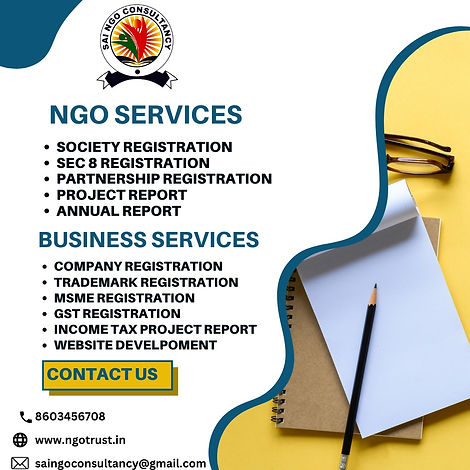WHAT IS NITI AAYOG? DO YOU KNOW HOW IT FUNCTIONS AND WHAT ARE ITS BENEFITS?
NITI AAYOG,which stands for National Institution for Transforming India, is a policy think tank and a planning body of the Government of India. It was established on January 1, 2015, to replace the erstwhile Planning Commission of India.
The primary objective of NITI Aayog is to provide strategic and technical advice to the central and state governments on policy issues related to various sectors such as health, education, agriculture, energy, and infrastructure.
NITI Aayog is an important body for the Government of India as it helps to bridge the gap between policymaking and implementation. It is designed to work as a collaborative platform for governments, policy-makers, experts, and stakeholders from different sectors of the economy to come together and design and implement policies for India's sustainable and inclusive development..

FOR MORE INFORMATION CONTACT: https//ngotrust.in/
1. Formulation of National Policies: NITI Aayog's primary function is to formulate and recommend national policies and programs to the central and state governments based on the current economic and social scenarios.
2. Monitoring of Policies: NITI Aayog is responsible for monitoring the implementation of the policies and programs recommended by it, including the evaluation of their impact.
3. Research and Development: NITI Aayog conducts research and development activities on various issues related to the economy, education, health, energy, infrastructure, and other social sectors.
4. Cooperation with States: NITI Aayog serves as a platform for cooperation and coordination between the central government and the state governments for the overall development of the country.
5. Promotion of Innovation and Entrepreneurship: NITI Aayog promotes innovation and entrepreneurship in various sectors to boost the economy and create employment opportunities.
6. International Cooperation: NITI Aayog also collaborates with international organizations and countries to learn from best practices and to promote India's development interests globally.
7. Capacity Building: NITI Aayog also provides capacity-building support to the central and state governments, and other stakeholders to improve governance and policy implementation.

FOR MORE INFORMATION CONTACT: https//ngotrust.in/
Structure of NITI Aayog:
The Vice-Chairman heads NITI Aayog, and it has full-time members and part-time members. The Vice-Chairman is appointed by the Prime Minister, and the members are appointed by the central government. The CEO of NITI Aayog is a full-time member and is appointed by the central government.
In addition, NITI Aayog also has experts from various sectors as part-time members who provide specialized knowledge and expertise in specific areas.
NITI Aayog also has a governing council comprising the Chief Ministers of all the states and Union Territories. The governing council meets periodically to discuss various issues related to the economy and development of the country and to provide guidance to NITI Aayog on policy matters.
Achievements of NITI Aayog:
Since its establishment, NITI Aayog has achieved several significant milestones in various areas, including:
1. Implementation of GST: NITI Aayog played a crucial role in the implementation of the Goods and Services Tax (GST), which replaced multiple indirect taxes with a single tax regime.
2. Digital India: NITI Aayog played a significant role in the Digital India initiative, which aims to transform India into a digitally empowered society and knowledge economy.
3. Ayushman Bharat: NITI Aayog was instrumental in launching the Ayushman Bharat scheme, which provides health insurance to the underprivileged sections of society.
4. Atal Innovation Mission: NITI Aayog launched the Atal Innovation Mission to promote innovation and entrepreneurship in various sectors and to create employment opportunities.

FOR MORE INFORMATION CONTACT: https//ngotrust.in/
NITI Aayog, as India's premier think tank and policy-making body, has several benefits for the country's overall development. Some of the benefits of NITI Aayog are:
1. Advancing India's Economic Agenda: NITI Aayog aims to promote India's economic agenda by providing strategic and technical advice to the central and state governments. It assists the government in formulating and implementing policies that can drive growth and create job opportunities.
2. Bridging the Gap between Policymaking and Implementation: NITI Aayog works as a bridge between policymaking and implementation. It is designed to work as a collaborative platform for governments, policy-makers, experts, and stakeholders from different sectors of the economy to come together and design and implement policies for India's sustainable and inclusive development.
3. Promoting Cooperative Federalism: NITI Aayog serves as a platform for cooperation and coordination between the central government and the state governments for the overall development of the country. It promotes the concept of cooperative federalism, where the central and state governments work together to achieve common goals.
4. Encouraging Innovation and Entrepreneurship: NITI Aayog aims to encourage innovation and entrepreneurship in various sectors to boost the economy and create employment opportunities. It has launched several initiatives, such as the Atal Innovation Mission, to promote innovation and entrepreneurship in the country.
5. Promoting Digital Transformation: NITI Aayog plays a crucial role in the Digital India initiative, which aims to transform India into a digitally empowered society and knowledge economy. It promotes the use of technology in various sectors to improve governance and public service delivery.
6. Strengthening India's Global Position: NITI Aayog collaborates with international organizations and countries to learn from best practices and to promote India's development interests globally. It represents India in various international forums and promotes India's stance on global issues.
7. Fostering Inclusive Development: NITI Aayog promotes inclusive development by providing support to the central and state governments to address issues related to health, education, agriculture, energy, and infrastructure. It helps to ensure that the benefits of development reach all sections of society, including the marginalized and underprivileged.
8. Monitoring and Evaluation of Policies: NITI Aayog is responsible for monitoring the implementation of the policies and programs recommended by it, including the evaluation of their impact. This ensures that policies are implemented effectively, and their impact on the ground is assessed.
In summary, NITI Aayog has several benefits for India's overall development. It serves as a platform for cooperative federalism, promotes innovation and entrepreneurship, encourages digital transformation, and fosters inclusive development. It provides strategic and technical advice to the central and state governments to advance India's economic agenda and promotes India's development interests globally.
FOR MORE INFORMATION CONTACT: https//ngotrust.in/
FAQS
Here are some frequently asked questions related to NITI Aayog:
1. What is NITI Aayog, and what is its role in India's development?
NITI Aayog is a policy think-tank of the Government of India, established to replace the erstwhile Planning Commission. It is responsible for providing strategic and technical advice to the central and state governments in policy-making, fostering innovation and entrepreneurship, promoting digital transformation, and monitoring and evaluating policies.
2. What are the main functions of NITI Aayog?
NITI Aayog's main functions include:
· Providing strategic and technical advice to the central and state governments on policy-making and implementation.
· Fostering innovation and entrepreneurship in various sectors to boost the economy and create employment opportunities.
· Promoting digital transformation in India and ensuring the use of technology in various sectors to improve governance and public service delivery.
· Collaborating with international organizations and countries to promote India's development interests globally.
· Monitoring the implementation of policies and programs and evaluating their impact.
3. What is the difference between NITI Aayog and the Planning Commission?
NITI Aayog differs from the Planning Commission in several ways. While the Planning Commission focused on centralized planning and resource allocation, NITI Aayog aims to promote cooperative federalism and provides technical and strategic advice to the central and state governments on policy-making. It also promotes innovation, entrepreneurship, and digital transformation in various sectors and monitors policy implementation and evaluation.
4. What are some of the initiatives launched by NITI Aayog?
NITI Aayog has launched several initiatives, including:
· Atal Innovation Mission: A program to promote innovation and entrepreneurship in the country.
· Digital India: A program to transform India into a digitally empowered society and knowledge economy.
· National Health Stack: A digital infrastructure to improve the delivery of health services.
· Aspirational Districts Programme: A program to accelerate the development of underdeveloped districts in the country.
· India Innovation Index: An index to measure the innovation capabilities of states and union territories in India.
5. How does NITI Aayog promote sustainable and inclusive development in India?
NITI Aayog promotes sustainable and inclusive development by providing support to the central and state governments in addressing issues related to health, education, agriculture, energy, and infrastructure. It also promotes the use of technology and innovation in these sectors to improve governance and public service delivery. NITI Aayog also fosters the concept of cooperative federalism, where the central and state governments work together to achieve common goals and ensure that the benefits of development reach all sections of society, including the marginalized and underprivileged.
*If you need any help with any services for your organization, please message me on our Official Whatsapp no- 8603456708
📍Visit -
https://ngotrust.in
Email: saingoconsultancy@gmail.com
Find us on : https://ngotrust.in/
YouTube: https://youtu.be/jF8saeOTlR0
Google :
https://g.page/Ngo-Business-Consultant?gm-
Regards
𝕾𝖆𝖎 𝕹𝖌𝖔 & 𝕭𝖚𝖘𝖎𝖓𝖊𝖘𝖘 𝕮𝖔𝖓𝖘𝖚𝖑𝖙𝖆𝖓𝖙𝖆𝖓𝖈𝖞
(AN ISO CERTIFIED ORGANIZATION)

Comments
Post a Comment